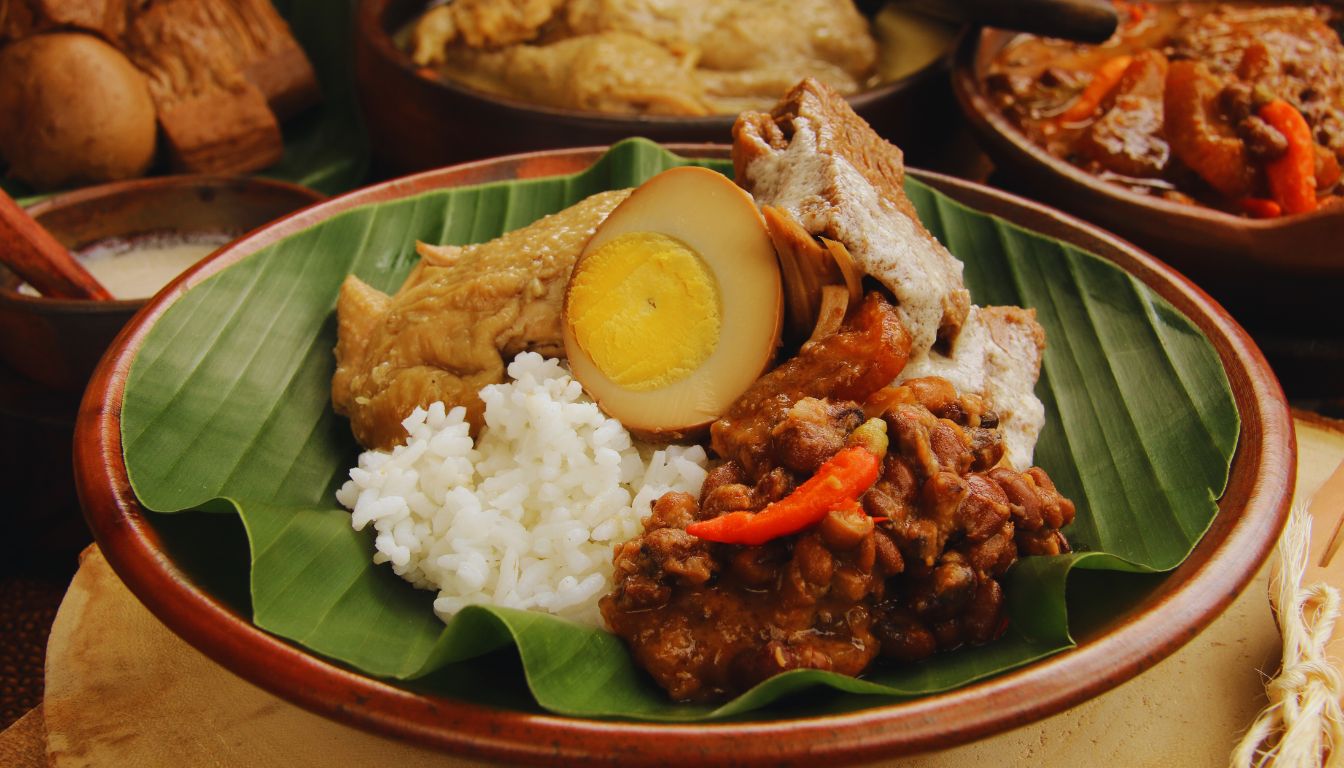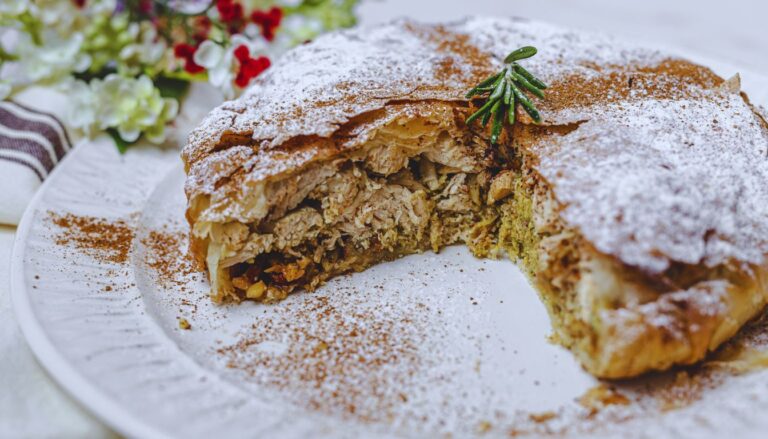Gudeg, Yogyakarta Indonesia
In the mystical heart of Java, where ancient palace walls whisper centuries-old secrets, Yogyakarta’s most beloved culinary treasure slowly simmers in earthenware pots. Gudeg, a dish of young jackfruit transformed through patience and tradition, embodies the sweet soul of Javanese cuisine. As dawn breaks over the Sultan’s palace, the aromatic symphony of palm sugar, coconut milk, and exotic spices wafts through the historic streets, telling stories of royal kitchens and time-honored traditions.
Table of Contents
Origins and History
Gudeg’s origins are deeply rooted in the royal Javanese culture of Yogyakarta, dating back to the establishment of the Sultanate in the 18th century. The dish emerged from the ingenious use of young jackfruit, abundant in Java’s fertile volcanic soil. Originally prepared in the royal palace kitchens, Gudeg represented the refined tastes of Javanese nobility while reflecting the resourcefulness of local culinary artisans.
Historical significance:
- Created during the Mataram Kingdom era
- Adopted as the signature dish of Yogyakarta
- Traditionally cooked in clay pots over wood fires
- Preparation methods passed down through generations
Cultural Significance
In Yogyakarta’s cultural landscape, Gudeg holds a special place:
- Symbol of Yogyakarta’s cultural identity
- Essential part of traditional ceremonies
- Featured in royal celebrations
- Central to local economic life
Social importance:
- Creates community bonds through communal cooking
- Supports local market ecosystems
- Preserves traditional cooking methods
- Represents Javanese philosophy of patience and harmony
Ingredients and Preparation
The magic of Gudeg lies in its lengthy preparation process and carefully selected ingredients.
Core Ingredients:
- Young jackfruit (nangka muda)
- Coconut milk (santan)
- Palm sugar (gula jawa)
- Teak leaves for coloring
- Galangal
- Bay leaves (daun salam)
- Candlenuts
- Garlic
- Shallots
Traditional Accompaniments:
- Krecek (spiced cow skin)
- Chicken eggs
- Tofu
- Tempeh
- Spicy sauce (sambal goreng)
The preparation process involves:
- Initial Preparation:
- Cutting young jackfruit into uniform pieces
- Preparing spice paste
- Soaking teak leaves
- Cooking Process:
- Slow cooking for 12-24 hours
- Continuous stirring and monitoring
- Gradual addition of coconut milk
- Achieving perfect caramelization
- Final Steps:
- Reducing liquid to desired consistency
- Balancing flavors
- Preparing accompaniments
Where to Try It
Notable Establishments
- Gudeg Yu Djum: Famous for traditional dry Gudeg
- Gudeg Pawon: Known for overnight cooking process
- Gudeg Permata: Popular among locals and tourists
Neighborhood Recommendations
- Wijilan Street: Historic Gudeg district
- Malioboro Area: Traditional warung establishments
- Kraton (Palace) Area: Royal recipe variations
Eating Etiquette and Customs
Understanding local dining customs enhances the Gudeg experience:
Traditional Practices:
- Eaten for breakfast or lunch
- Served with rice on banana leaves
- Using right hand for eating (if eating traditionally)
- Sharing dishes with companions
Cultural Considerations:
- Respect for food preparation
- Gratitude expression to servers
- Modest dress when dining
- Patience during serving process
Seasonal Considerations
Gudeg is available year-round with seasonal variations:
Dry Season (April-October):
- More concentrated flavors
- Outdoor dining popular
- Festival celebrations
- Best time for street food exploration
Wet Season (November-March):
- Comfort food atmosphere
- Indoor dining preferred
- Warmer serving temperature
- Perfect with hot tea
Modern Interpretations
While maintaining tradition, contemporary adaptations include:
- Quick-cooking methods for modern lifestyles
- Packaged versions for travelers
- Fusion presentations in upscale restaurants
- Healthier cooking techniques
Practical Information and Travel Tips
Essential information for enjoying Gudeg in Yogyakarta:
Timing and Costs:
- Best times: 6:00 AM – 10:00 AM for breakfast
- Average cost: 15,000-50,000 IDR ($1-3 USD)
- Some establishments open 24 hours
Location Tips:
- Many famous spots in Wijilan Street
- Early morning offers freshest servings
- Some places require pre-ordering
Cultural Insights:
- Learn basic Indonesian greetings
- Respect local customs
- Photography usually welcomed
- Modest dress recommended
Making Your Gudeg Journey Memorable
Embrace the complete Yogyakarta experience by arriving early to witness the morning preparation, engaging with local vendors, and savoring your Gudeg amid the city’s historic atmosphere. Consider taking a cooking class to learn the intricate process, and remember that every bite connects you to centuries of Javanese culinary artistry in this culturally rich sultanate.













